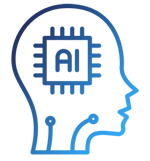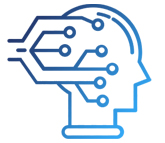- AI

Artificial Intelligence

Smart Products & Services
We follow Smart Products & Services

Intelligent Business Functions & Processes
We follow Intelligent Business Functions & Processes

Robotic Process Automation
We follow Robotic Process Automation

Personalized
healthcareWe follow Personalized healthcare

Identifying at-risk patients
We follow Identifying at-risk patients

Optimized routing and scheduling
We follow Optimized routing and scheduling
- ML

Machine Learning

Predictive
AnalyticsWe follow Predictive Analytics

Service Personalization
We follow Service Personalization

NLP
We follow NLP (Natural Language Processing)

Stock Market Forecasting
We follow Stock Market Forecasting

Fraud Prevention
We follow Fraud Prevention

Recommender engines
We follow Recommender engines
- blockchain
- IOT

Internet of Things
- AR
- Business Solutions

Business Solution

Business Performance Management
We follow Business Performance Management

Decision Making & Big Data Analytics
We follow Decision Making & Big Data Analytics

Enterprise Data Management
We follow Enterprise Data Management
- Apps

Apps

Native Apps
We follow Native Apps

Cross Platform Apps
We follow Cross Platform Apps

Web Apps
We follow Web Apps

Hybrid Apps
We follow Hybrid Apps

Cloud Native Apps
We follow Cloud Native Apps
- Lab

Explore the Leading AI Development Software of 2023
Artificial intelligence (AI) tools are becoming increasingly dominant in modern business. The continuous advancements in AI development software spur this trend. Developers often must create quite advanced and complicated systems when working on AI and ML projects. Because these systems can be hard to build, developers are excited to use platforms that can handle the tricky parts.
The most proficient AI development software offers a powerful framework and toolkit for crafting customised AI solutions across various uses. This blog delves into the contemporary landscape of such famous software. Knowing this software is now integral to the operations of software development firms so they can offer the best products to their clients.
What is AI Development Software?

Artificial Intelligence (AI) development software empowers individuals and businesses to quickly construct potent AI tools, streamlining various tasks quickly and efficiently. You’re likely familiar with several renowned AI tools already crafted.
Illustrative instances encompass AI Chatbots like ChatGPT, noteworthy alternatives such as ChatSonic, and AI writing tools like Jasper, which facilitate content generation and optimisation. Additionally, live chat applications speed up online customer support, AI marketing tools aim to create sales copy and workflow automation, and AI art generators like MidJourney and PhotoSonic cater to producing superb digital artwork and images.
Moreover, AI voice generators and similar text-to-speech tools can generate lifelike speech from textual input across diverse applications. Notably, AI SEO tools enhance website content for improved search results rankings.
While these ready-made AI solutions serve admirably for many, developers now find it increasingly effortless to use AI development software to craft bespoke AI tools that cater to specific requirements. Depending upon the chosen platform, the availability of drag-and-drop interfaces and other user-friendly no-code functionalities speed up this process.
Using AI development software, online stores customise chatbots to increase conversions and enhance customer service quality. Enterprises utilise tailored AI-based ML software to build advanced data reports for revenue growth. This only touches on a small portion of the many possibilities available.
Types of AI Development Software

In general, AI development software usually falls into these categories:
Deep Learning: This category concentrates on training artificial neural networks like human brain functions, especially for tasks necessitating human-like intelligence. Deep learning software is used in areas including computer vision, natural language processing, and speech recognition. It uses designs like convolutional neural networks (CNNs) and recurrent neural networks (RNNs). These tools often rely on large datasets, advanced optimization methods, and powerful computing capabilities to improve model performance.
AI Development Platforms: These complete solutions allow AI application creation from the ground up. Comes with pre-built algorithms and an intuitive interface, they simplify the design and adaption of AI models. Developers of multiple skill levels can easily access and utilise user-friendly features such as drag-and-drop functionalities. These platforms serve as a versatile basis for AI projects. The best AI development platforms are pre-trained models, user-friendly interfaces (UI), and great support resources for easy navigation.
Machine Learning: These techniques help computers identify patterns and relationships in data so they may learn from it. It operates various algorithms and methodologies like clustering, decision trees, and regression analysis; they create predictive models qualified for data-driven decisions. The models are continually growing as new data is added.
Conversational AI: This emphasises imitating human-like conversations. It enables the development of interactive and responsive conversational voices. These technologies employ natural language processing (NLP) and other AI approaches to learn from and react to user input.
Do you want to create software that is based on AI? Dial us. As a trusted software development firm, we specialise in leading-edge software creation and custom iOS app development in the UK. Let’s transform your ideas into AI-powered realities. Contact us today!
Top AI Development Software In Order of Preference

Google Cloud AI Platform
Among the prominent names, Google Cloud AI Platform stands out. This cloud-based service empowers developers to construct, train, and deploy machine learning models utilising widely adopted frameworks. It offers an array of readily available pre-trained models, facilitating quick initiation of tool development with fundamental elements in place.
Key Attributes:
- Extensive documentation for creating complex products and mastering platforms.
- Provision for popular frameworks like Scikit-learn and TensorFlow.
- A platform for developing, training, and deploying scalable, user-friendly models.
- Added natural language processing (NLP) algorithms, predictive analytics, and picture and speech recognition.
Shopify applies Google’s Discovery AI to enhance advanced online product searches for proficient retailers.
Microsoft Azure

Another notable contender is Microsoft Azure AI, which provides enterprise-ready AI services and tools. These tools suit building, deploying, and administering large-scale AI solutions incorporating deep learning, machine learning, and cognitive benefits. The platform also offers dependable pre-trained models, giving developers immediate usage with an assurance of reliability.
Key Attributes:
- Encompasses tools catering to deep learning, machine learning, and cognitive services.
- Integrates seamlessly with favoured development tools such as Visual Studio and GitHub.
- A scalable platform for comprehensive AI solution construction, deployment, and management.
- Enables AI developers to manufacture custom AI models.
IBM Watson

In conversational AI, IBM Watson is a distinguished platform for question-and-answer scenarios. This platform uses the skills of natural language processing (NLP), machine learning, and knowledge representation to decipher questions and furnish accurate responses. Its primary utilisation spans numerous business domains, particularly customer support usage.
Key Attributes:
- Utilises deep learning, machine learning, and NLP techniques.
- Comes equipped with APIs, development tools and pre-built AI services.
- Offers integration capabilities for customer services, healthcare, and education applications.
Infosys XtractEdge
Coming from Infosys, the Infosys XtractEdge AI platform emerges as a solution that allows businesses to streamline intricate processes, enhance productivity, and take valuable insights. Achieving this is made possible through machine learning, deep learning, and natural language processing (NLP). Its primary focus revolves around extracting information from documents.
Key Attributes:
- Through ML and NLP, mines can uncover hidden data within documents.
- Provides the opportunity for automating the extraction of data from documents.
- Converts non-textual content, such as images, into text via optical character recognition (OCR) for processing.
H2O.AI
The H2O.AI platform introduces an open-source machine learning domain. This enables the development and deployment of AI models at scale. The platform presents an array of pre-trained, open-source AI models and algorithms. Its open-source nature enables developers to self-host models or opt for on-premises or cloud-based deployment.
Key Attributes
- Showcases an open-source AI platform.
- Designed predominantly for business applications.
- Provides versatile deployment options, serving specific security needs.
Google Dialogflow
Google Dialogflow, from Google Cloud AI, serves as a chatbot-building service. Conversational agents are built by developers using NLP and seamlessly integrated with external messaging platforms. Through a process of standard question-and-answer submissions, Dialogflow learns and learns the contextual usage of phrases and words to craft meaningful responses.
Numerous prominent AI chatbots and customer support platforms like LandBot, Ubisend, and Trengo seamlessly integrate with Dialogflow, creating sophisticated bots.
Key Attributes:
- Empower developers to craft conversational interfaces using NLP.
- Enables integration of chatbots with voice assistants and diverse messaging platforms.
- Has an intuitive interface, catering to a less technical audience than other NLP solutions.
BigML
BigML is a machine learning platform that was developed in the cloud. It provides developers with various tools and algorithms to build and apply predictive models using deep neural networks, decision trees, and random forests. BigML is one of the most accessible platforms because of its well-known user-friendliness.
Key Attributes:
- Presents options for both on-premises and cloud deployments.
- uses machine learning algorithms, such as deep neural networks, decision trees, and random forests.
- Offers a platform for constructing, deploying, and managing custom AI models.
Viso Suite
Viso Suite shines as an AI-infused computer vision software platform. Catering to businesses, it gives an extensive application development platform centred around computer vision. This platform allows businesses to craft applications covering traffic monitoring and inventory counting tasks.
Key Attributes:
- combines a framework for application development with solid computer vision capabilities.
- Utilises a low-code solution that accelerates the progress of developing advanced AI systems.
- Features pre-built integrations, further enhancing the agility of the low-code environment.
Observe.AI
Observe.AI emerges as a robust AI-driven call centre solution. It uses NLP and speech recognition; it accomplishes real-time analysis and transcription of customer conversations. This aids businesses in garnering insights into customer emotion, trend identification, and agent performance enhancement on a large scale. Customer experience (CX) and support-focused AI engineers can use Observe.AI to speed up insights assimilation significantly.
Key Attributes:
- Layers speech recognition, transcription, and NLP to develop a potent voice platform.
- Covers analytical abilities to track and oversee activities throughout the support organisation.
- Provides in-depth analytics and insights to identify and address issues while utilising the latest performance trends.
What Can Be the Prime AI Development Software for Your Business?
In the current market, Google Cloud AI Platform and Microsoft Azure AI stand out as the top choices.
Google Cloud AI Platform caters proficiently to developers seeking a cloud-based, scalable solution. It seamlessly supports widely adopted frameworks such as TensorFlow and Scikit-learn. This platform presents robust built-in algorithms that address tasks ranging from image recognition to NLP.
Microsoft Azure AI is an obvious choice for businesses looking to develop, deploy, and manage AI solutions on a big scale. It provides a set of AI tools and services that are business-ready. It seamlessly integrates with well-known development tools like GitHub and Visual Studio. This combined strength offers a robust and efficient environment for enterprises to employ AI’s capabilities successfully.
Also, IBM Watson is a notable competitor for those who want advanced Conversational AI products.
Conclusion
Now that you have come to know about these softwares, we hope you have discovered a lot about it.
You can contact our software development firm if you consider implementing AI or ML in your business or wish to serve clients better. So, discover the best ML and AI software development capability and see the results with our proficient software development services in the UK.
Moreover, we also have proficiency in app development. Whether you’re in quest of custom Android or specialised custom iOS app development, we’re here to comfort you with ML and AI technology.
So, reach out to our AI software or custom app development company to board for the AI-based software or app creation journey!



















































Leave a Reply